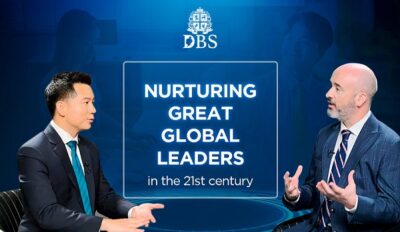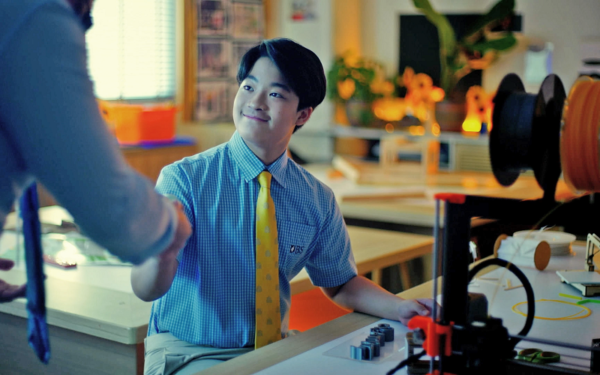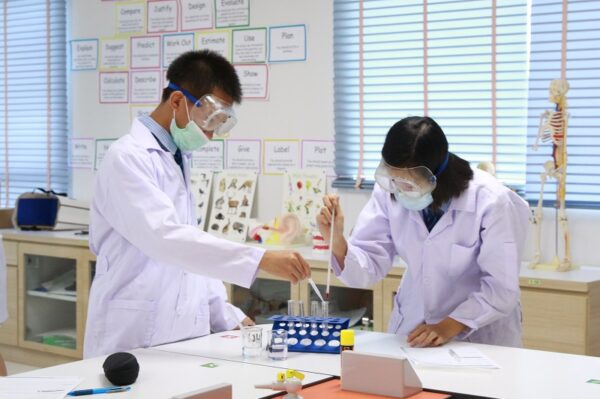Nurturing Great Global Leaders บ่มเพาะผู้นำแห่งศตวรรษที่ 21 ตั้งแต่ยังเล็ก ที่โรงเรียนนานาชาติ DBS มีความหมายอย่างไร?
- Great Global Leaders ในความหมายของ DBS คือการที่เด็กรู้ว่าตนเองมีความสนใจอะไร เลือกทำสิ่งนั้น และยังมอบคุณค่าให้สังคมได้ด้วย
- การจะมีภาวะผู้นำ สามารถเริ่มได้ตั้งแต่ยังเล็ก เริ่มจากการศึกษาที่โรงเรียน เพื่อปูพื้นฐานความรู้และพัฒนาทักษะให้แก่นักเรียน ผ่านกระบวนการ 3 อย่าง
- การเป็นผู้รอบด้าน (Well-roundedness) ให้เด็กได้ทดลองสำรวจทุกสิ่งทุกอย่าง (Explore) เพื่อให้เป็นผู้มีความรอบด้าน
- การเป็นผู้เชี่ยวชาญ (Excellence) ให้เด็กรู้ลึก มีความเป็นเลิศ ในวิชาที่ตนสนใจ
- การมีทัศนคติแบบผู้ประกอบการ (Entrepreneurship Mindset) คือเด็กจะต้องมี
- ความคิดสร้างสรรค์ (Creativity)
- แรงบันดาลใจ ต้องค้นหาให้เจอว่าตนชอบอะไร (Passion) ซึ่งจะเชื่อมโยงกับการที่เด็กได้สำรวจทดลองทำหลาย ๆ อย่างมาก่อน (Explore)
- ความกล้าหาญ (Courage) เด็กต้องมีความกล้าหาญในการลงมือทำตามความต้องการของตนเอง ใช้ความคิดสร้างสรรค์และแรงบันดาลใจของตนมาสร้างสิ่งที่เป็นรูปธรรม ความกล้าหาญนั้นเกิดจากความมั่นใจในตนเอง จากการให้เด็กได้ลองเรียนรู้ทำอะไรเยอะ ๆ โดยผู้ใหญ่ไม่ไปด่วนตัดสินพวกเขา

หลักสูตรการศึกษาระบบอังกฤษโรงเรียนเอกชนที่โรงเรียนนานาชาติ DBS ใช้ แตกต่างจากหลักสูตรการศึกษาของไทยอย่างไร?
- รูปแบบการศึกษาของระบบอังกฤษ มีลักษณะเหมือนกับรูปทรงของสามเหลี่ยม
- 1. ฐานกว้างของสามเหลี่ยม คือการเรียนของชั้นเด็กเล็ก ให้เด็กได้ลองเรียนหลากหลายวิชา ทั้งในห้องเรียนและกิจกรรมต่าง ๆ จะทำให้เด็กมีความรู้รอบด้าน มีความเข้าใจตัวเองมากขึ้น “ไม่ได้ลอง ไม่ได้เรียน ก็จะไม่รู้”
- 2. ยอดแหลมของสามเหลี่ยม คือการเรียนของชั้นเด็กโต เมื่อเด็กได้เรียนอย่างกว้าง ๆ และได้ทดลองหลายสิ่งแล้ว ก็จะค้นพบว่าตัวเองชอบหรือถนัดอะไร จากนั้นพวกเขาจะสามารถเลือกเรียนวิชาที่ตนสนใจในเชิงลึกได้ จนกลายเป็นผู้เชี่ยวชาญในสาขาวิชาที่ตนเลือก
- “รู้บางสิ่งเกี่ยวกับทุกสิ่ง และรู้ทุกสิ่งเกี่ยวกับบางสิ่ง” คือกุญแจสู่ความสำเร็จ

โรงเรียนนานาชาติ DBS จะปลูกฝังทักษะแห่งศตวรรษที่ 21 นี้ให้แก่นักเรียนได้อย่างไร?
- หลักสูตรโรงเรียนเอกชนของ DBS มอบชั่วโมงเรียนที่ยาวนานกว่าโรงเรียนอื่น เน้นกิจกรรมส่งเสริมทักษะหลังเลิกเรียนวิชาให้เด็กได้ต่อยอดความสนใจและพัฒนาทักษะชีวิต (Life / Soft Skills) เช่น ภาวะผู้นำ การสื่อสาร การทำงานเป็นทีม เพื่อเตรียมความพร้อมเผชิญความท้าทายของโลกอนาคต
- ทักษะแห่งศตวรรษที่ 21 ไม่ได้ต่างจากทักษะของศตวรรษก่อนหน้า แต่สิ่งที่ต่างคือ ความรู้ ในยุคนี้ที่เปลี่ยนแปลงและเกิดขึ้นใหม่อย่างรวดเร็วและตลอดเวลา
- สิ่งสำคัญคือการมีพื้นฐานความรู้ที่แน่น ต้องมีความรู้เสียก่อน ถึงจะพัฒนาทักษะและต่อยอดความรู้ต่อได้
- มหาเศรษฐีหลายคนที่ประสบความสำเร็จในธุรกิจของตน ต่างก็มีความรู้พื้นฐานในสาขาวิชาในอุตสาหกรรมนั้น ๆ กันทุกคน

ทักษะแห่งศตวรรษที่ 21 ที่สำคัญที่สุดสำหรับในโลกยุคปัจจุบันและอนาคตคือทักษะอะไร?
- ทักษะที่สำคัญที่สุดของศตวรรษที่ 21 คือความสามารถในการต่อยอดความรู้ (the ability to continue to learn)
- แต่การจะต่อยอดความรู้ได้ เราจะต้องมีพื้นฐานความรู้ที่แน่นเสียก่อน ผ่านการสร้างกรอบความคิด (Mental Framework)
- Mental framework คือ การที่เราพยายามทำความเข้าใจกับสิ่งต่าง ๆ รอบตัวเรา คือการพัฒนาความรู้แบบพอกพูนให้เพิ่มขึ้นเรื่อย ๆ
- การพัฒนาความรู้นั้นขึ้นอยู่กับภาวะเรื่องภาระทางปัญญา (Cognitive Load) อย่างมาก หมายความว่า การเรียนที่ซับซ้อนและหนักเกินไป จะส่งผลกระทบกับผู้เรียน ทำให้ผู้เรียนเรียนรู้ได้อย่างยากลำบาก

บทบาทของครูและโรงเรียนที่สำคัญคืออะไร?
- ครูของโรงเรียนนานาชาติ DBS มีเทคนิคการสอนแบบ การค่อย ๆ ส่งต่อความรู้แบบทีละน้อย ค่อย ๆ ปล่อยความรู้ให้แก่นักเรียนเพิ่มขึ้นเรื่อย ๆ เพื่อให้นักเรียนสามารถเชื่อมต่อความรู้ได้ตรงจุด ไม่สับสน เพื่อช่วยแบ่งเบาภาระทางปัญญาของนักเรียน (Cognitive Load)
- การค่อย ๆ ส่งต่อความรู้ทีละเล็กละน้อย ทำให้นักเรียนค่อย ๆ เติมความรู้ให้ตนเองจนเกิดความเข้าใจอย่างถ่องแท้ เมื่อมีความรู้แข็งแกร่งแล้ว นักเรียนก็จะสามารถปรับใช้ความรู้นั้น ๆ เชื่อมโยงกับทักษะพิเศษต่าง ๆ ตั้งคำถาม และต่อยอดให้มีประสิทธิภาพได้
- โรงเรียนนานาชาติ DBS สอนนักเรียนด้วยวิธี การสอนทางตรง (Direct Instruction) คือการให้นักเรียนได้พูดคุยโต้ตอบกับครู เป็นการสื่อสารสองทาง (2-Way Communication) ครูจะอธิบายหัวข้อที่เรียนและคอยตรวจสอบว่านักเรียนเข้าใจดีหรือไม่ และถามนักเรียนว่ามีความรู้อะไรอะไรมาก่อนบ้าง
- ครูยังสนับสนุนให้นักเรียนได้เรียนรู้ด้วยตนเอง เปลี่ยนบทบาทการเป็นครู (Teacher) เป็นภัณฑารักษ์ (Curator) ที่ออกแบบเนื้อหาการเรียนเพื่อท้าทายนักเรียนสำหรับการต่อยอดความรู้และเผชิญโลกอนาคตด้วยความมั่นใจ
- การสอนทางตรงและตอบโต้กับเด็กระหว่างการเรียน จะช่วยให้ครูสามารถตรวจสอบความรู้ของนักเรียนได้ตลอดเวลา ว่าตอนนั้นพวกเขามีความรู้ขนาดไหนและต้องการอะไรเพิ่มเติมไหม เด็กจะสามารถต่อยอดความรู้ได้เร็ว และกลายเป็นผู้ที่เป็นเลิศได้เร็ว
- ครูสนับสนุนให้เด็กตั้งคำถาม พูดคุยและโต้ตอบกับครู ดังคำกล่าวที่ว่า “ถ้าถามออกมา เธอจะเป็นคนโง่เพียง 5 นาที แต่ถ้าไม่ถาม เธอจะเป็นคนโง่ตลอดไป” (“If you ask a question, you will be a fool for 5 minutes. But if you don’t ask that question, you will be a fool forever.”)
- ดังนั้นหน้าที่ของครู คือการสร้าง กระตุ้น ส่งเสริม ให้นักเรียนเกิดแรงบันดาลใจที่จะเรียนรู้ (Spark, Inspire, and Provoke) ซึ่งสิ่งนี้เป็นสิ่งที่หุ่นยนต์ทำไม่ได้ เทคโนโลยีอาจจะสามารถมอบการศึกษาและความรู้ให้ทุกคนได้อย่างทั่วถึง แต่ครูผู้สอนต่างหากที่จะสามารถชี้แนะ ให้แรงบันดาลใจ และสนับสนุนนักเรียนคนหนึ่ง ๆ ได้
- ดังนั้นระบบการศึกษา ครู รวมถึงผู้ปกครอง ต้องสร้างบรรยากาศที่เอื้ออำนวยต่อความรักในการเรียนรู้ให้แก่เด็ก ๆ ตั้งแต่ยังเล็ก อุปสรรคใหญ่ ๆ ของเรื่องนี้คือ เวลา เราสามารถเป็นผู้เชี่ยวชาญได้ในทุกอย่างถ้าเรามีเวลาฝึกมันมากพอ ดังนั้น เราต้องมอบเวลาให้เด็ก ๆ ตั้งแต่ยังเล็ก เอาใจใส่พวกเขา มอบและเพิ่มพูนความรู้ให้พวกเขาอย่างเหมาะสม เพื่อให้พวกเขาได้ฝึกฝนตนเอง เป็นผู้ที่มีทั้งความรอบด้าน และรอบรู้ พร้อมเป็นผู้นำแห่งศตวรรษที่ 21








